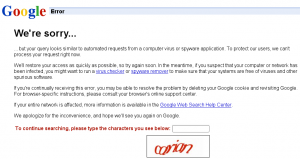Search Engines do not like ranking report software. Period.
In the past, some search engines allowed an API access key to be used for ranking report software, and it can still be utilized today. Without utilizing the API key for the reports, you could be blocked from accessing the search engine. Software-automated queries drain resources, bandwidth, and inflates ad impressions, which is used to compute quality score for Pay-per-Click Ads. In response, Google is particularly aggressive about blocking repeated queries from the same IP address. Google would rather keep advertisers happy then overly aggressive SEO’s who check their rankings incessantly.
Personalized Search
With the advent of creating accounts at the search engines, personal search histories have been accumulated. When AOL published only a few random search histories, I doubt they felt that any one of those anonymous searchers could be identified, yet some were.
Personalized search is important to the search engines for many ways, not the least of which is personalized advertising that can be crafted solely for you, based on your preferences, search history and associated accounts.
Personalization will affect search results. After all, the search engines are attempting to provide the best, most relevant results to the searcher, and using their search history will enable the engine to adjust the results as necessary to create that personal relevance.
I expect this to continue to grow, as the line of privacy and advertising becomes increasingly blurred. Many people choose to give up privacy in order to receive more relevant advertising, and do not see the risks.
As a result, the rankings you see may differ from your neighbor, simply based on your past search and click-through behavior.
Google’s Promote Results
Google’s search results instituted a feature recently, called promote results.
It’s simple. I you like one result over another, simply promote the result. Of course, many webmasters see this as a means to affect rankings. Sorry, but no. If it does, it is on a very minute scale. Anything that can be manipulated by people on a large scale tends to hold little value.
If anything I have seen this used very effectively by marketing managers that are able to go into their bosses’ computer and promote their website for specific search terms. That way, to the boss, they are always #1, and he leaves them alone, and stops demanding to know why the website is not ranking first.
Tricky, but effective.
Multiple Search Engine DataCenters
Each search engine has data centers located all over the country and all over the world. Even in one office, different computers may hit a different data center. Data centers are consistently being updated, and it is very easy to see different results, usually only within a few rankings, from a search of different data centers.
The API Access
With the API key, the search engine could direct the automated queries to a specific data center. However, it was immediately apparent that the data center was out of sync with the live results. We liked to joke that the data center for rankings queries was out-of-date and hidden in a forgotten closet.
Without an API Key, you would be likely to see this:
Either way, it was more accurate for a client to simply open a browser and search for words and rankings manually. The results are much more accurate. Having a company run a rankings report, save it to PDF, and then send by email, results in a report that is outdated before it was begun.
Regional Weighting
A New Yorker searching for the term “Zoo” on Google is going to get results that show the Bronx Zoo as being the most relevant result. A Google searcher in Southern California will see the San Diego Zoo as number 1. Regional searches are being weighted and slowly implemented. Obviously, this doesn’t work with many terms, as they are world-wide in scope.
However, Google has recently, within the past few years, placed a heavy emphasis on local results, maps and business listings. Offering searchers local based results creates more advertising inventory, and also connects users to locally-based providers. Intentional or not, Google is turning the world market back into a local market. Locally-based searches provide a more relevant result to a local searcher.
Social Network
A friend of mine was searching Google for analytic information, and he saw a result from my blog in the first page of results. While I’d love to thin that I earned that spot on the first page with my brilliant analytics writing, it was actually because I was in his social circle, and the results were presented because of the Social Circle Beta in Google. The reason that page was in the results he was logged into Google, had a Google Social Profile, and Google was recommending articles as a result of our social profiles being linked.
In addition to the Social results in the search results, there are news article suggestions and book suggestions rounding out the bottom of the first page of results. The search results page is becoming a very busy place, and also a very personalized space. As searchers start to link social profiles, eCommerce profiles, regional preferences, the search results are going to reflect more of a personal nature, and be nearly unique to each searcher.
Where is this Heading?
Continual changes like this Social Profile Suggestion Beta program show the direction that a search engine like Google is heading. Google is integrating social recommendations, multimedia, rationalization and regionalization as a way of customizing search results specific to a person. The more information you provide to Google through your account, the more Google can and will customize your search results.
The days of gaining the #1 ranking in Google, and knowing that everyone searching will see that #1 ranking are over. Rankings are the “sugar high” of marketing, but now it’s time get down to the main course and start measuring better things . . . .

